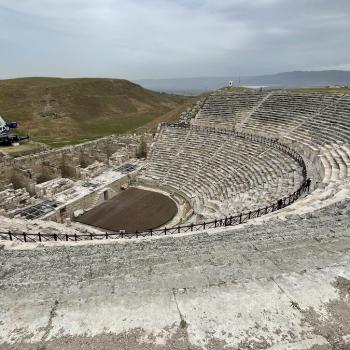
I don’t know exactly why we do this. Perhaps its pride, ego, narcissism—that seems to be a popular word these days—our penchant to be admired. Sometimes its purely to show off. But if you get a group of guys together, eventually they begin to talk about their scars. Maybe gals do this too. I know that when our daughter enters such a conversation with her brothers that she easily stands her ground. Her stories of restraining unruly children as a social worker in a Baltimore school will compete with any story that the boys will share!
Human beings like to compare. They like to one up each other. No matter if it’s a scar and consequent story, or if it is the latest gadget we show off to our neighbor, we compete with each other to make ourselves feel better. If we were honest, our competition with friends, colleagues, and neighbors disguises a desire to justify ourselves. It legitimizes a sense of self-worth and value.
Mission Competition
We do this in ministry too. It doesn’t matter if we are missionaries boasting of the rapid number of churches planted, or critics of such efforts boasting of how they have endured and persevered trials to see even one church started. Pastors do this when comparing congregational sizes at the local ministerial. Professors do this too when discussing their latest book, article, or lecture at a prestigious university. We just want to be better than those around us.
And, we are in good company. Even Jesus’s disciples did it. John was certain to let us know that he could out run Peter (John 20:24). He and his brother James solicited the help of their mother when seeking a better position on Jesus’s team (Matt 20:20-28). Peter even tried to put Jesus in His place by correcting Him! (Matt 16:22).
Mission Clarity
Things changed, however. When the Holy Spirit empowered the disciples, a clarity of mission and unity of purpose overcame any competition or jockeying for power. Such clarity displayed itself by the character of the disciples. It’s the next characteristic:
“Fourth, disciples exhibit the fruit of the Spirit (Eph 4–5). The unity and peace among disciples can only be explained by the Holy Spirit. Disciples do not compete with one another or jockey for positions of influence. After all, they understand that they already have a position of influence in their identity with Christ. They are ambassadors who are given the great responsibility of representing their Father. This is only possible in a life full of the Holy Spirit.” (Ephesiology, loc 3741)
The early disciples were by no means perfect. In every sense of the idea, they exemplified a work in progress. For example, Paul and Barnabas had their little spat over Mark. Our modern Western imagination likes to make Mark out to be a frightened young man on his first missionary journey. We’ve largely ignored the beautiful Coptic tradition of Peter and Mark’s ministry in Egypt. Thomas Oden plausibly argued that the mission to North Africa where Mark and his family originated motivated his departure from Paul.
Whatever the case, we can be sure that the Holy Spirit united Paul, Barnabas, and Mark. He animated their mission.
Mission Unity
Yet, it’s striking to consider that Paul disputed not only with Barnabas, but also with Peter—which resolved in Galatia—as well as with Demas along with a whole host of people in Asia Minor. Even so, he would write such a compelling argument for unity.
“I therefore, a prisoner for the Lord, urge you to walk in a manner worthy of the calling to which you have been called, with all humility and gentleness, with patience, bearing with one another in love, eager to maintain the unity of the Spirit in the bond of peace. There is one body and one Spirit—just as you were called to the one hope that belongs to your call—one Lord, one faith, one baptism, one God and Father of all, who is over all and through all and in all. But grace was given to each one of us according to the measure of Christ’s gift.” (Eph 4:1-7)
It’s tempting to blame Paul’s ostensibly gruff personality for his ministry conflicts. Again, our modern imagination uses Paul to justify reasons to defend ourselves. They provide excuses for separating from those who do not agree with our ministry philosophy. After all, since Paul delivered some over to Satan, it is okay for a church or denominational leader to disfellowship its members.
Yet, consider Paul’s work:
- Compassion for the widow (1 Tim 5:1-16)
- Care for the poor (Gal 2:10)
- Love for his colleagues (2 Tim 1:3-4)
- Burden for all the churches (2 Cor 11:28)
- Welcoming of the stranger (Rom 12:13)
- Passion to go where Christ has not been preached (Rom 15:20)
- Willingness to suffer (2 Tim 2:8)
- Defending the faith (Acts 17:16-21)
A great standard for God’s mission! Perhaps our penchant to read our ministries, even ourselves into Paul, are misinformed.
Unity of doctrine, unity of faith, unity of calling, all for the purpose of mission. These are hallmarks of a disciple. I dare say, in the midst of conflict, they were Paul’s as well. “This is only possible in a life full of the Holy Spirit.”











